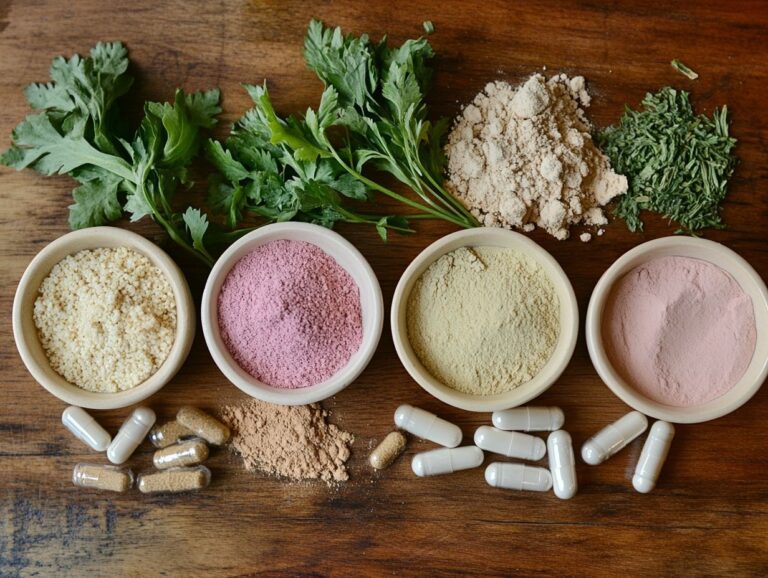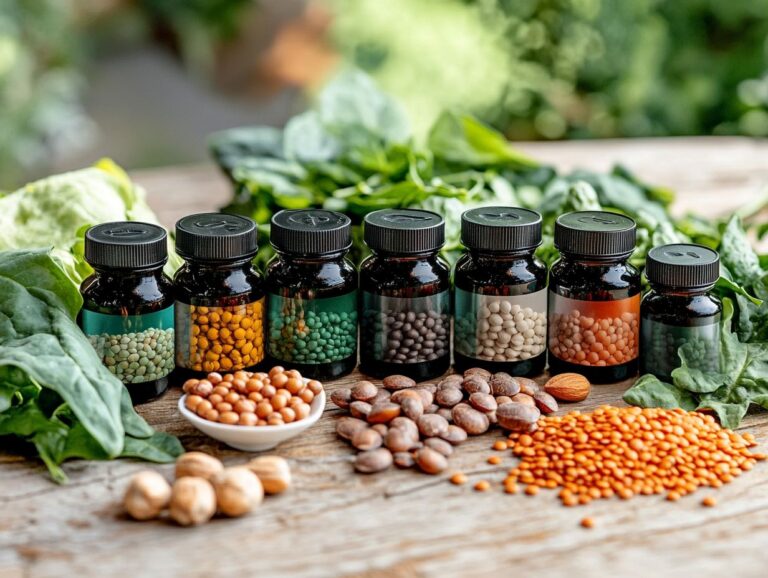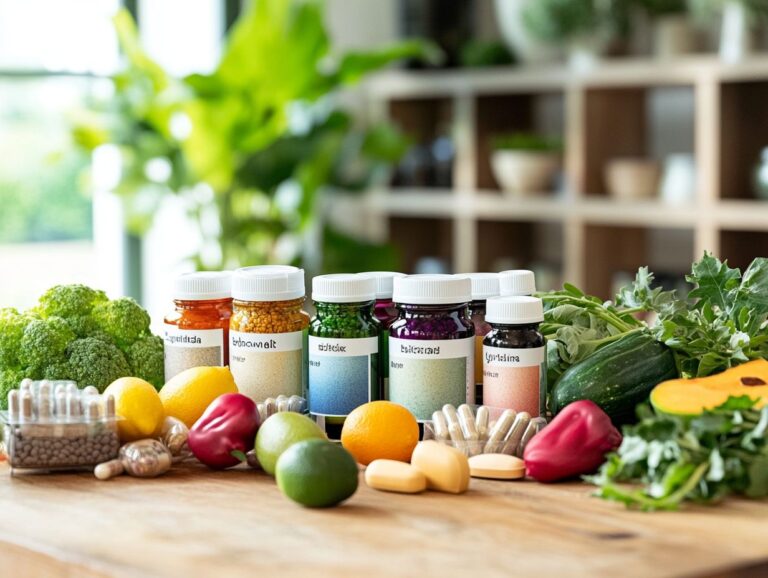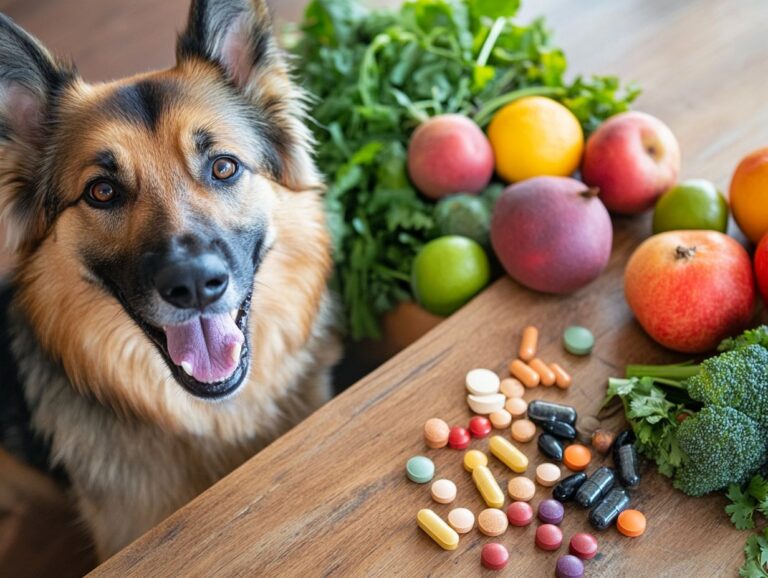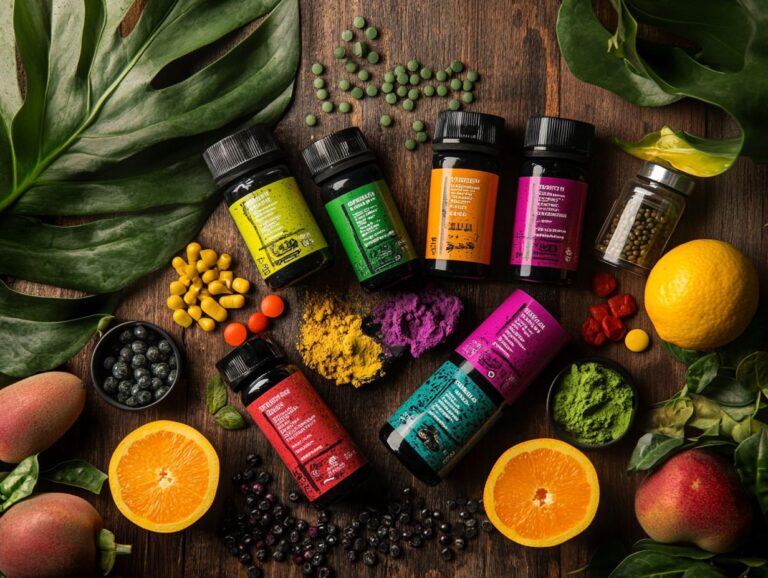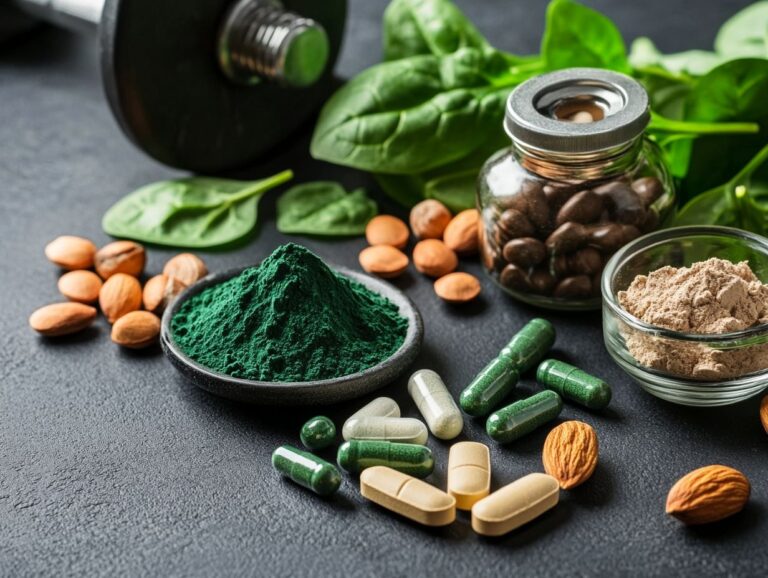A vegan diet can enhance gym performance, but does it also lead to reduced energy and strength? This article explores the specifics of a vegan diet, highlights essential supplements for maintaining optimal health on a vegan diet, and recommends the best vegan supplements to boost gym performance. Additionally, it addresses common myths surrounding veganism and fitness. Here are some tips for improving gym performance on a vegan diet.
Key Takeaways:
- Vegan diets may lack certain nutrients, making supplements essential for optimal performance.
- Key supplements for vegans include Vitamin B12, Iron, Calcium, Vitamin D, and Omega-3 Fatty Acids.
- Plant-based protein powders, creatine, beta-alanine, BCAAs, and glutamine are excellent vegan gym supplements for building muscle and improving workout performance.
What Is a Vegan Diet?
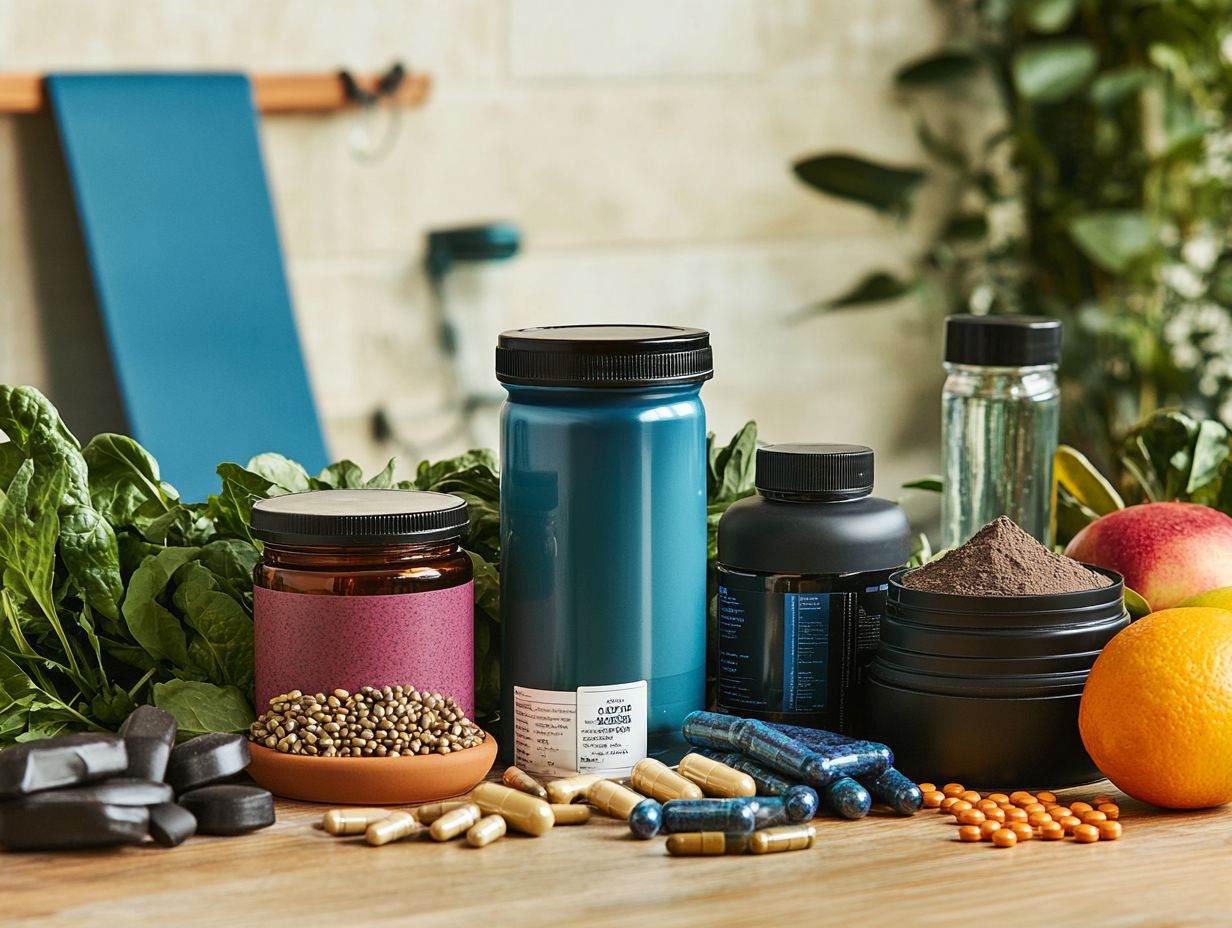 A vegan diet is a plant-based diet that completely excludes all animal products, including meat, dairy, and eggs. Vegans also refrain from consuming honey and other animal-derived products, opting solely for plant-based foods such as fruits, vegetables, legumes, grains, nuts, and seeds. The popularity of veganism is rapidly increasing among individuals seeking to enhance their health, minimize their environmental impact, and support animal welfare. Research indicates that a well-planned vegan diet can offer significant health benefits, including lower rates of chronic diseases, enhanced athletic performance, and improved muscle recovery when supplemented appropriately with dietary aids. However, it is crucial for vegan athletes to be mindful of potential nutrient deficiencies that may arise from this restrictive diet.
A vegan diet is a plant-based diet that completely excludes all animal products, including meat, dairy, and eggs. Vegans also refrain from consuming honey and other animal-derived products, opting solely for plant-based foods such as fruits, vegetables, legumes, grains, nuts, and seeds. The popularity of veganism is rapidly increasing among individuals seeking to enhance their health, minimize their environmental impact, and support animal welfare. Research indicates that a well-planned vegan diet can offer significant health benefits, including lower rates of chronic diseases, enhanced athletic performance, and improved muscle recovery when supplemented appropriately with dietary aids. However, it is crucial for vegan athletes to be mindful of potential nutrient deficiencies that may arise from this restrictive diet.
Why Are Supplements Important for Vegans?
Supplements play a crucial role in the health and performance of vegans, particularly in addressing nutrient deficiencies that may arise from a plant-based diet. Since vegans do not consume animal products, they may lack essential nutrients such as vitamin B12, iron, calcium, and omega-3 fatty acids, which are vital for muscle function, energy metabolism, and overall well-being. For vegan athletes, supplements can aid in achieving muscle gain, enhancing recovery, and maintaining optimal health while adhering to a strict vegan diet.
1. Vitamin B12
Vitamin B12 is a crucial nutrient for vegans because it is primarily found in animal products, making supplementation necessary to prevent deficiency. This essential vitamin plays a vital role in energy production, brain function, and the formation of red blood cells. Inadequate intake of vitamin B12 can lead to fatigue, anemia, and cognitive impairment in vegans, negatively affecting their overall health and athletic performance. Vegans should be aware that the best sources of vitamin B12 include fortified foods such as plant-based milks, breakfast cereals, and nutritional yeast. The recommended dietary allowance for adults is 2.4 micrograms per day; however, vegans may need higher dosages in supplement form. A deficiency in vitamin B12 can lead to life-threatening conditions, including nerve damage and irreversible neurological disorders, underscoring the importance of regular monitoring and supplementation to maintain optimal health.
2. Iron
Iron is an essential nutrient in a vegan diet because most plant-based sources contain non-heme iron, which is absorbed less efficiently by the body compared to heme iron from animal sources. Vegans should carefully monitor their iron levels to prevent deficiencies, which can lead to fatigue, reduced immune function, and impaired athletic performance. Supplementation with iron can be particularly beneficial, especially for vegan athletes engaged in resistance training or high-intensity workouts. Many common plant-based sources of iron, such as lentils, beans, tofu, and fortified cereals, have lower absorption rates for similar reasons as zinc and calcium. Consequently, it is crucial for those following a vegan diet to consume these foods alongside items rich in vitamin C, such as citrus fruits or bell peppers, during meals. This combination can enhance the body s ability to absorb non-heme iron, improving overall iron status. Iron deficiency is especially concerning for physically active individuals, as it can impair endurance and recovery, thereby limiting performance.
3. Calcium
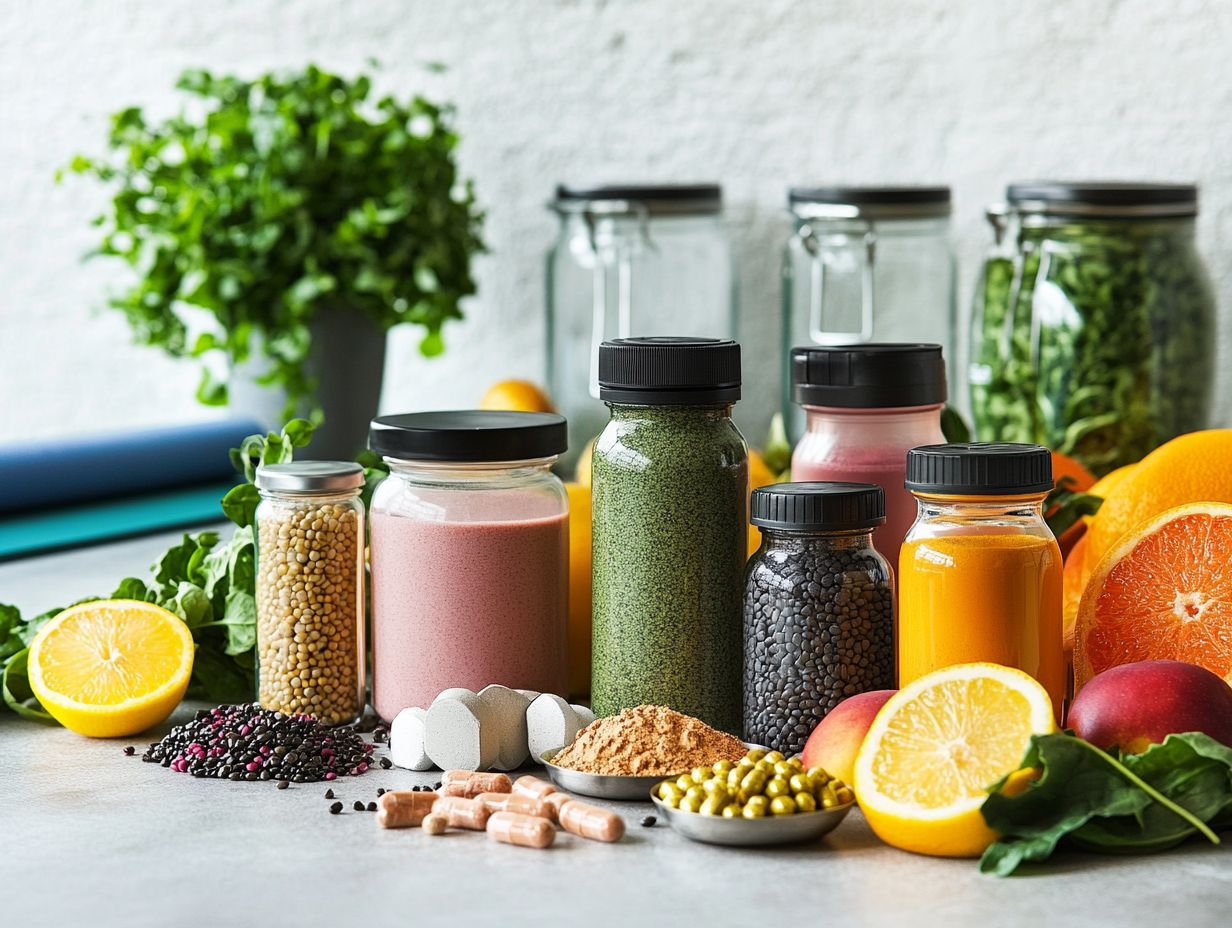 Calcium plays a vital role in supporting bone health, muscle function, and nerve transmission, making it particularly important for vegans. However, many plant-based sources may not provide sufficient calcium to meet daily requirements. Without proper supplementation, vegans risk calcium deficiency, which can weaken bones and increase the likelihood of fractures. To ensure adequate calcium intake, it is essential to consider fortified foods or supplements that can help fill these potential nutrient gaps. Incorporating a diverse array of calcium-rich foods into a vegan diet can significantly enhance overall health and performance. Excellent sources of this important mineral include:
Calcium plays a vital role in supporting bone health, muscle function, and nerve transmission, making it particularly important for vegans. However, many plant-based sources may not provide sufficient calcium to meet daily requirements. Without proper supplementation, vegans risk calcium deficiency, which can weaken bones and increase the likelihood of fractures. To ensure adequate calcium intake, it is essential to consider fortified foods or supplements that can help fill these potential nutrient gaps. Incorporating a diverse array of calcium-rich foods into a vegan diet can significantly enhance overall health and performance. Excellent sources of this important mineral include:
- Leafy green vegetables such as kale and collard greens
- Fortified plant-based milks
- Tofu
- Almonds
- Chia seeds
- Dried figs
For individuals engaged in athletic activities, adequate calcium is crucial not only for maintaining bone density but also for supporting muscle contraction and nerve signaling, both of which are vital for optimal athletic performance. Being aware of these sources and regularly monitoring calcium levels can help individuals thrive on a plant-based diet.
4. Vitamin D
Vitamin D is essential for vegans due to its crucial roles in calcium absorption, immune function, and muscle health. However, it can be challenging to obtain adequate amounts through a plant-based diet alone, as there are few natural sources of vitamin D in vegan foods. As a result, supplementation is often necessary, particularly for individuals living in areas with limited sunlight. Vitamin D can enhance athletic performance, increase muscle mass, and contribute to overall health. Unfortunately, most vitamin D-rich foods are animal-based, such as fatty fish and egg yolks. Therefore, fortified plant-based alternatives, like certain dairy-free milks, orange juices, and cereals, become vital sources of this nutrient. Additionally, ultraviolet light-treated mushrooms offer a rare vegan option that provides a natural source of vitamin D. For many vegans, a lichen-based vitamin D3 supplement is considered the best way to maintain sufficient levels for optimal health. Regular consultations with healthcare providers can help tailor supplementation strategies to prevent deficiencies that could impair muscle function and immune response.
5. Omega-3 Fatty Acids
Omega-3 fatty acids are essential for vegans as they promote heart health, support brain function, and reduce inflammation. Since omega-3s are primarily found in fish and seafood, vegans must seek alternative sources, such as algae. Incorporating omega-3 supplements into a vegan diet can aid in recovery, enhance athletic performance, and support overall health. While obtaining these important fats can be challenging, many plant-based foods are rich in ALA (alpha-linolenic acid), including:
- Flaxseeds
- Chia seeds
- Walnuts
These foods help meet omega-3 requirements and ensure overall nutritional adequacy. However, the conversion of ALA to the more active forms of omega-3, EPA and DHA, is limited, making the direct addition of algae oil through supplementation an effective way to boost levels. This is particularly important for athletes, as omega-3s have been linked to reduced muscle soreness, improved joint health, and enhanced cardiovascular function, all of which are crucial for optimal performance.
What Are the Best Vegan Supplements for Gym Performance?
A select few high-quality vegan supplements can assist vegan athletes in optimizing their gym performance and supporting muscle gain. These supplements may include:
- Plant-based protein powders
- Creatine
- Branched-chain amino acids (BCAAs)
- Beta-alanine
Each supplement serves specific functions in muscle recovery, strength, and overall performance. Targeted supplementation helps bridge nutrient gaps in a vegan diet, enabling athletes to achieve their fitness goals.
1. Plant-Based Protein Powders
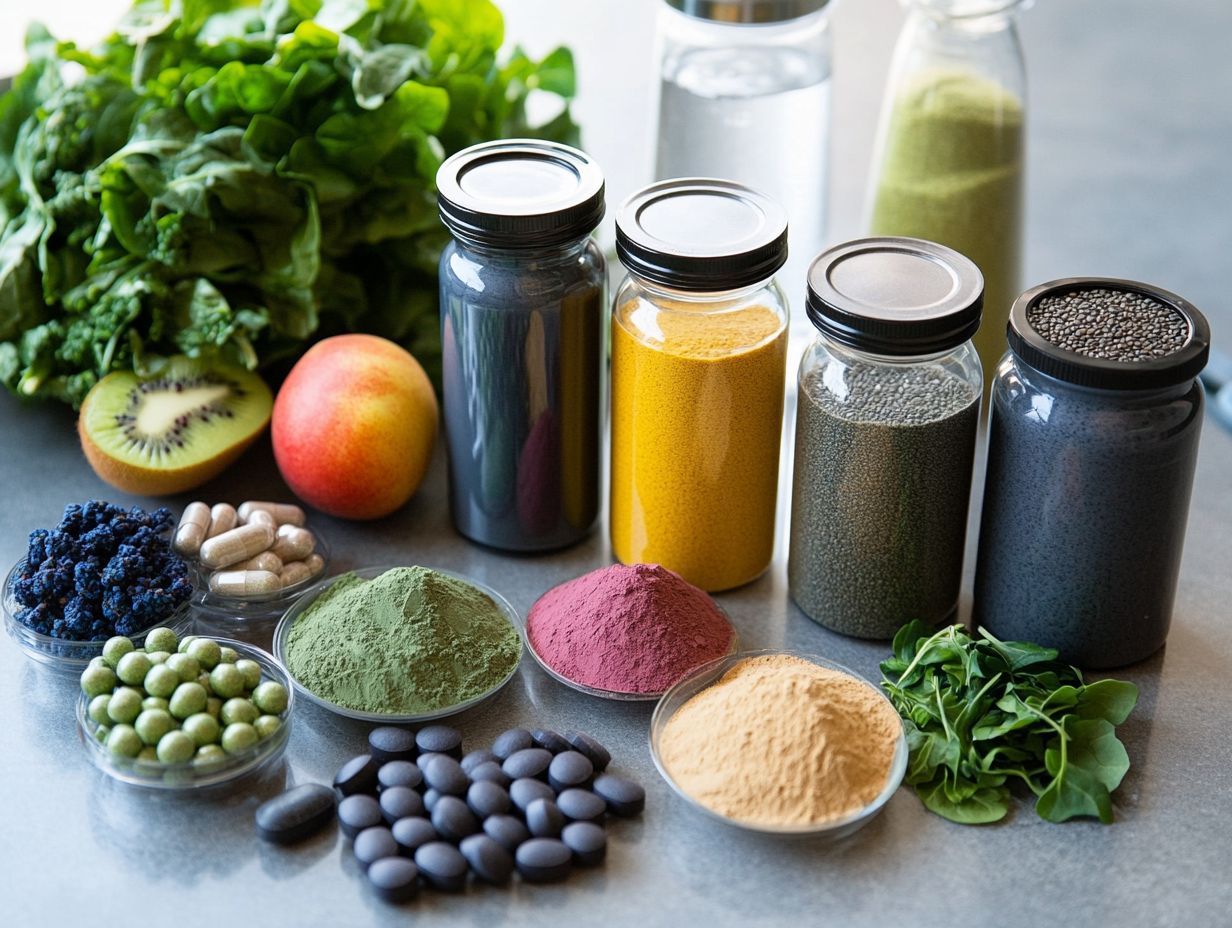 Plant-based protein powders are essential supplements for vegans seeking to enhance their protein intake, which is vital for muscle growth and recovery. These protein powders are derived from sources such as peas, brown rice, and hemp, providing all the essential amino acids necessary for muscle repair and energy metabolism. By consuming plant-based protein, vegan athletes can effectively meet their protein needs, which is crucial for improving their performance in the gym. Along with promoting muscle development, plant-based protein powders contribute to overall health. For instance, pea protein is rich in branched-chain amino acids (BCAAs), which are essential for muscle repair after exercise. Meanwhile, brown rice protein offers an amino acid profile that complements pea protein, helping athletes achieve their daily protein intake goals. Hemp protein, on the other hand, is high in healthy fats and fiber, which aids in digestion. Understanding the various forms of plant-based protein and their nutritional benefits is important for athletes aiming to optimize their recovery and performance while adhering to a vegan diet.
Plant-based protein powders are essential supplements for vegans seeking to enhance their protein intake, which is vital for muscle growth and recovery. These protein powders are derived from sources such as peas, brown rice, and hemp, providing all the essential amino acids necessary for muscle repair and energy metabolism. By consuming plant-based protein, vegan athletes can effectively meet their protein needs, which is crucial for improving their performance in the gym. Along with promoting muscle development, plant-based protein powders contribute to overall health. For instance, pea protein is rich in branched-chain amino acids (BCAAs), which are essential for muscle repair after exercise. Meanwhile, brown rice protein offers an amino acid profile that complements pea protein, helping athletes achieve their daily protein intake goals. Hemp protein, on the other hand, is high in healthy fats and fiber, which aids in digestion. Understanding the various forms of plant-based protein and their nutritional benefits is important for athletes aiming to optimize their recovery and performance while adhering to a vegan diet.
2. Creatine
Creatine is an effective supplement for vegans seeking to increase strength, enhance performance, and support muscle growth in response to resistance training. While creatine is primarily found in animal products, there are vegan-friendly creatine supplements available, allowing athletes to enjoy its benefits without compromising their dietary choices. Additionally, incorporating creatine into a vegan diet can help fill nutrient gaps related to muscle function and energy metabolism. By incorporating creatine into their workout routines, vegan athletes can boost their energy levels, improve their overall training results, and promote muscle repair. This is particularly beneficial for vegan bodybuilding and those looking to enhance performance through effective supplementation. Creatine supplements work by providing muscles with adenosine triphosphate (ATP), the fuel needed for short bursts of intense activity, such as weight lifting or sprinting. Vegan athletes can find creatine sourced from fermented plant materials, typically available in the form of powders or capsules. These vegan protein powders are designed to support energy metabolism and muscle recovery, making them a valuable addition to any vegan diet. These supplements can be easily mixed into smoothies, pre-workout shakes, or simply added to water, facilitating their incorporation into daily routines. This approach helps ensure adequate dietary intake of essential nutrients needed for athletic performance and muscle repair. With a minimum intake of three grams per day, regular use of creatine can lead to increased endurance during workouts, quicker recovery times, and enhanced muscle strength, all of which can help athletes achieve their fitness goals. Ensuring proper supplementation can also address nutrient deficiencies that may arise from a plant-based diet.
3. Beta-Alanine
Beta-alanine is an important supplement for anyone engaged in bodybuilding, particularly vegan athletes looking to boost their endurance and energy levels during workouts. It helps to counteract nutrient gaps that could hinder performance. Beta-alanine is a popular supplement among vegans seeking to enhance athletic performance and improve muscle recovery following strenuous exercise. It works by increasing the level of carnosine in the muscles, which helps buffer the build-up of acids during high-intensity workouts, ultimately boosting endurance and promoting growth. This enables vegan athletes to train harder for longer periods and recover more quickly. Since beta-alanine is typically found in animal protein sources, its supplementation helps vegan athletes address a nutritional gap that could negatively affect their performance. Incorporating supplements like beta-alanine can significantly enhance performance and support a sustainable vegan bodybuilding routine. With elevated carnosine levels, athletes often experience reduced fatigue and an enhanced ability to maintain high effort levels during strength or endurance training. Additionally, beta-alanine aids in recovery by reducing soreness and promoting quicker replenishment of energy stores, thus supporting overall muscle function and energy metabolism. This not only enhances athletic performance but also supports a more sustainable and effective fitness journey for many vegans.
4. Branched-Chain Amino Acids (BCAAs)
BCAAs are critical for vegan athletes seeking to improve strength and muscle repair, particularly after intense workouts. These essential amino acids play a vital role in muscle protein synthesis. Vegetarian athletes looking to enhance muscle repair and recovery, particularly after strenuous exercise, should consider incorporating branched-chain amino acids (BCAAs) into their regimen. BCAAs consist of three essential amino acids leucine, isoleucine, and valine that promote muscle protein synthesis and help reduce exercise-induced muscle soreness. BCAA supplementation is particularly beneficial for vegan athletes aiming to support their recovery following workouts and improve strength. These amino acids can be obtained from plant-based protein powders or vegetarian protein powder capsules that deliver concentrated forms of BCAAs. Such supplements are especially useful after intense exercise, when muscles require repair and replenishment. BCAAs support overall athletic nutrition and can help fill nutrient deficiencies common in a vegan diet. Additionally, consuming foods rich in essential amino acids, such as:
- quinoa
- lentils
- chickpeas
can further aid in recovery. This approach not only supports muscle recovery but also alleviates fatigue, allowing vegetarian athletes to engage in more efficient and sustainable exercise.
5. Glutamine
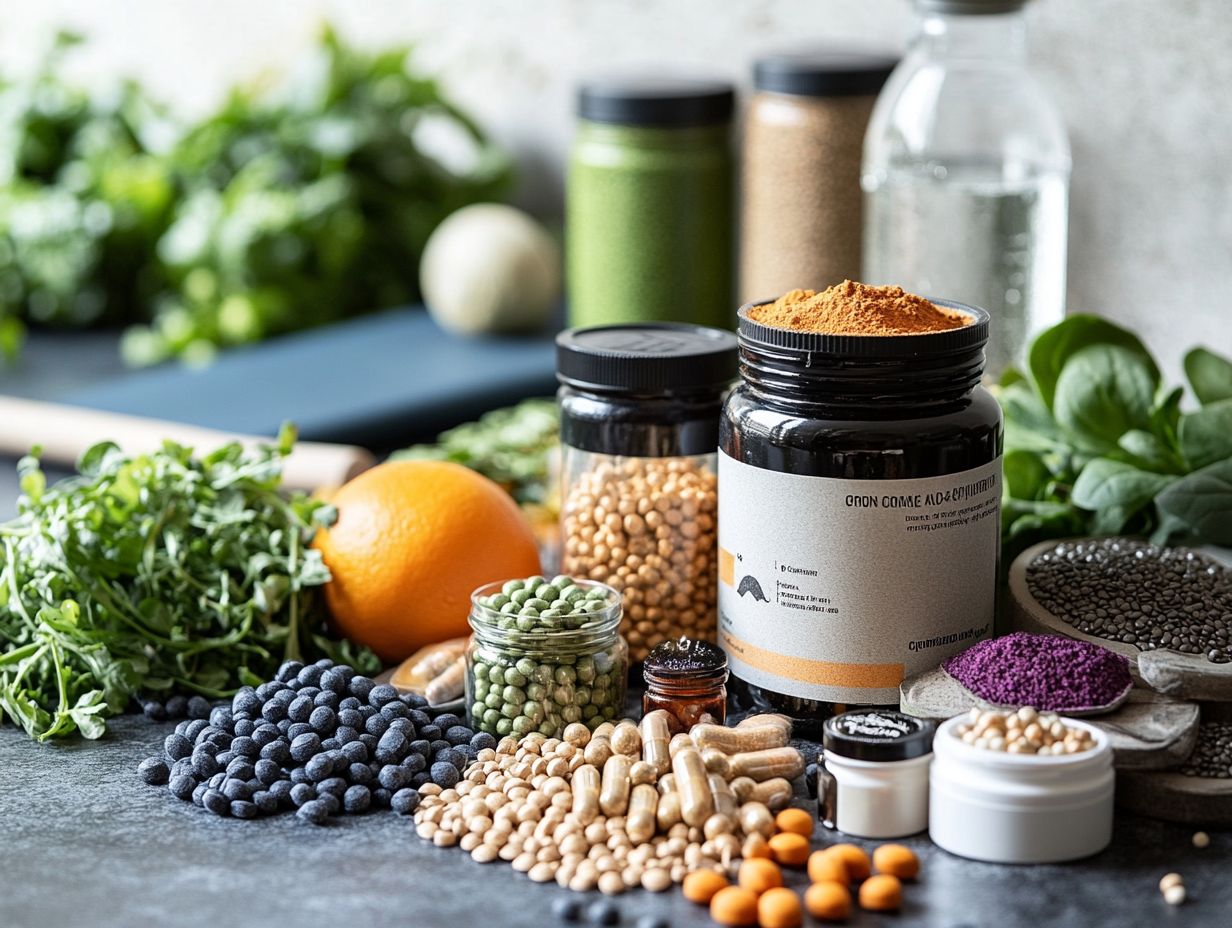 Glutamine is an essential amino acid for vegans, particularly those engaged in intense training, as it aids in muscle recovery and supports immune function. During periods of heavy training, glutamine levels can become depleted, resulting in increased muscle soreness and a weakened immune system. Supplementing with glutamine can help vegans maintain their energy levels and overall health, especially during rigorous athletic training. Supplementing with glutamine can help vegans maintain optimal recovery and promote overall health during rigorous workout regimens. This recovery process is especially crucial for vegan athletes, who may primarily rely on plant-based protein sources that can be lower in certain amino acids. Additionally, glutamine helps promote recovery and muscle function, which are integral to maintaining peak performance. Along with being vital for repairing muscle fibers, glutamine plays a key role in the functioning of immune cells, helping athletes avoid illness during strenuous training cycles. By incorporating glutamine into their diet whether through supplementation or by choosing glutamine-rich foods like peas and beans vegan athletes can enhance muscle recovery and strengthen their immune defenses. These benefits ultimately support longevity in their athletic careers and improve overall performance. Glutamine and other amino acids, like taurine, are vital for promoting recovery and athletic performance in vegan diets.
Glutamine is an essential amino acid for vegans, particularly those engaged in intense training, as it aids in muscle recovery and supports immune function. During periods of heavy training, glutamine levels can become depleted, resulting in increased muscle soreness and a weakened immune system. Supplementing with glutamine can help vegans maintain their energy levels and overall health, especially during rigorous athletic training. Supplementing with glutamine can help vegans maintain optimal recovery and promote overall health during rigorous workout regimens. This recovery process is especially crucial for vegan athletes, who may primarily rely on plant-based protein sources that can be lower in certain amino acids. Additionally, glutamine helps promote recovery and muscle function, which are integral to maintaining peak performance. Along with being vital for repairing muscle fibers, glutamine plays a key role in the functioning of immune cells, helping athletes avoid illness during strenuous training cycles. By incorporating glutamine into their diet whether through supplementation or by choosing glutamine-rich foods like peas and beans vegan athletes can enhance muscle recovery and strengthen their immune defenses. These benefits ultimately support longevity in their athletic careers and improve overall performance. Glutamine and other amino acids, like taurine, are vital for promoting recovery and athletic performance in vegan diets.
How to Choose the Right Vegan Supplements for Your Fitness Goals?
When choosing vegan supplements, consider those that enhance muscle growth, support energy metabolism, and improve strength and recovery. Key supplements include creatine, beta-alanine, BCAAs, glutamine, and essential vitamins and minerals like vitamin B12, vitamin D3, omega 3, zinc, and iron. Choosing the best vegan supplements for your fitness goals depends on your individual needs, dietary restrictions, and the intensity of your workouts. Supplements for vegan athletes should address nutrient deficiencies and support overall health, bodybuilding, and athletic nutrition. Whether your aim is to build muscle, increase strength, or enhance recovery, there are various supplements available to help you achieve these objectives. Understanding how each supplement interacts with your nutritional intake can significantly aid you in reaching both your athletic and overall health goals.
How to Incorporate Vegan Supplements into Your Gym Routine?
Incorporating vegan supplements like vegan protein powder, BCAAs, and beta-alanine into your gym routine can improve performance and muscle repair. Proper timing and dosage are key to maximizing their benefits. Using vegan supplements to enhance gym performance can be beneficial, but it’s essential to take them correctly to ensure their effectiveness. This includes timing the intake of your supplements in relation to your workouts, ensuring the correct dosage, and consuming them alongside whole foods that are rich in nutrients. For example, using vegan protein powder in post-workout shakes can enhance muscle recovery and promote growth. This approach creates a comprehensive plan tailored to your specific fitness goals. Understanding how and when to take vegan supplements can significantly improve energy levels and support muscle recovery.
What Are the Common Myths about Vegan Supplements and Gym Performance?
Common myths about vegan supplements include misconceptions that they are less effective than traditional ones. However, vegan supplements like vegan protein powder, essential fatty acids, and vitamins can support athletic performance, muscle growth, and recovery effectively. There are several common myths surrounding vegan supplements and their effectiveness in supporting athletic performance, leading to misconceptions among athletes and fitness enthusiasts. Some believe that vegan diets cannot provide adequate nutrients for bodybuilding and intense athletic training, but this is not true with proper supplementation. One prevalent belief is that vegan supplements cannot offer the same benefits as traditional supplements derived from animal sources, which can deter individuals from adopting a plant-based diet. In reality, vegan athletes can achieve their fitness goals with high-quality supplements from The Vegan Society and brands like Promino . In reality, with the appropriate knowledge and products, vegan athletes can achieve optimal performance, muscle growth, and recovery through effective supplementation. Understanding the role of essential fatty acids, plant-based protein, and vitamins in a vegan diet can significantly boost performance and health.
